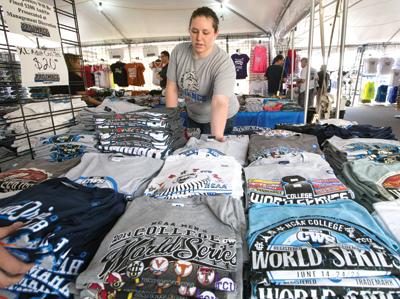Damani Leech bounced out of a CrossFit gym last week and drove his rented car across Omaha, Neb., to the Hilton, the NCAA’s headquarters for the College World Series.
Refreshed from his 6 a.m. workout, Leech, a former football player at Princeton and now a 15-year NCAA executive who oversees the CWS, looked ahead to a Tuesday doubleheader of baseball at TD Ameritrade Park on a 90-plus-degree day.
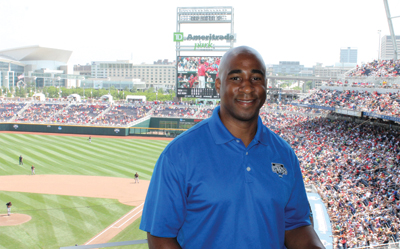 |
|
Longtime NCAA exec Damani Leech is in charge of the College World Series for the first time this month.
|
Some 18 hours later, an exhausted Leech lumbered out of the stadium, having watched Virginia and TCU throw 95 mph haymakers back and forth in a 15-inning game that lasted five hours. It was well past midnight when Leech finally exited the stadium and made the two-block walk back to the Hilton, where he collapsed in his bed.
In the hours between that day, Leech encountered the full range of issues that often
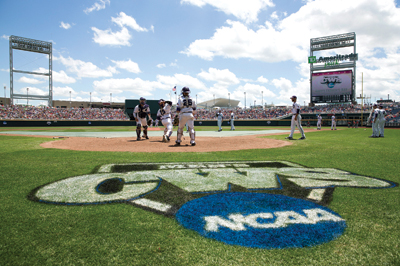 |
|
The College World Series has been an Omaha staple since 1950.
Photo by: NEWSCOM
|
leave him saying, “You never know what the day is going to bring.”
“We’ve had monthly conference calls leading up, so all that’s left to do by the time we get here is play the games,” said Leech, the NCAA’s managing director of championships, who supervises a staff of two dozen in Omaha for one of the NCAA’s most revered events, and certainly its most charming.
“But — extra innings, weather — it seldom seems to work out the way you think.”
Most NCAA championships rotate annually from city to city, but the CWS, an eight-team showdown to determine baseball’s national champion, is one of the exceptions. It’s been in Omaha since 1950. There’s a relationship between the event and the community that both sides cherish unlike any other championship.
More than 60 percent of the 300,000-plus fans who will attend over 10 or 11 days of the championship are locals. The CWS boasts a 98 percent renewal rate this year for its season-ticket holders — again, mostly from locals.
The current deal with the NCAA guarantees that the CWS will remain in Omaha through 2030. While some of the fans who return each year lament the move out of historic Rosenblatt Stadium four years ago, they understand how the event needed a bigger home with more modern amenities, like the distributed antenna system that was installed this year to improve cell signals for crowds that normally surpass 20,000 per game.
“The College World Series isn’t just a championship, it’s a relationship with a city and its people,” Leech said. “They don’t come to the games necessarily because they’re big baseball fans. They come because they want to be part of a cultural happening.”
■ ■ ■
The CWS crowd has a little bit of everything.
It’s part minor league baseball because of the local fan base.
It’s part festival because of the abundance of food vendors and the cornucopia of smells that accompany them inside and outside the stadium.
And it’s part bowl game because of the atmosphere created by dueling college fan bases in one venue.
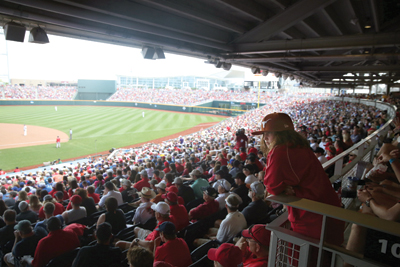 |
|
The two-week event draws more than 300,000 fans to TD Ameritrade Park.
Photo by: AP IMAGES
|
It’s also pure Omaha.
One thing it’s not is corporate.
But there are secrets of the Omaha experience that the NCAA and its rights holders, Turner and CBS, want to share with the corporate community. To that end, the NCAA, Turner and CBS threw their 17 corporate partners a curve ball by holding their annual partner summit in Omaha last week.
The summit typically has been later in the summer or the fall in large markets. Often, those markets are in the rotation to host the Final Four. But last year, the NCAA commissioned former Visa marketing chief Michael Lynch to review its partnership practices. One of his suggestions was to move the two-day summit to a date earlier in the year, so that partners could have more planning time between the summit and the next Final Four.
The idea to move the summit to June triggered another idea: Let’s get the partners out to Omaha for one of the NCAA’s most treasured events.
“We have several partners who activate in Omaha, and there are several more we’d like to see activate,” said Keith Martin, the NCAA’s managing director of marketing and broadcast. “As we’re starting to see a lot more college baseball on TV, we think we’ll see more partners invest in activation and advertising opportunities. That, to us, was a good reason to bring the summit here, so people can see it and feel it.”
Capital One (presenting sponsor of the CWS coverage on ESPN), Northwestern Mutual, Allstate and Buick have been among the biggest investors in the CWS, both in advertising with ESPN and activation at the CWS Fan Fest just outside the gates of TD Ameritrade. Enterprise Rent-A-Car also stepped up this year to sponsor a stage at the fan fest, providing the space with live music for large chunks of game day.
Turner Live Events manages the fan fest, just as it does ancillary events at other NCAA championships. The NCAA and Turner/CBS share profits from the fan fest 50/50.
Turner’s Will Funk and CBS’s Chris Simko, the two executives who oversee the partner program and sales efforts, opened the summit by welcoming close to 150 people, including partners and their agencies. Northwestern Mutual and Allstate presented case studies.
CBS broadcaster Jack Ford delivered the keynote, in part, by describing an NCAA under siege, and then he told his story of playing football for Yale.
“I’m the poster child,” Ford told his audience. “I directly attribute anything I’ve achieved to college athletics.”
Leech, wearing one of his many hats, joined the group for lunch before he set off for the ballpark.
■ ■ ■
 |
|
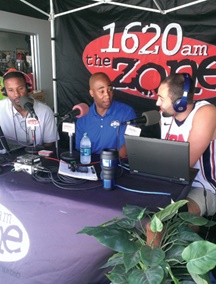 |
|
Leech’s 18-hour day includes (from left) a CrossFit workout; talking with local radio …
Photo by: MICHAEL SMITH (2)
|
Leech, 38, is a CrossFit fanatic. When he’s home in Indianapolis, he works out five times a week. That doesn’t change for the two weeks and two days he spends in Omaha each June.
Leech’s typical game day in Omaha begins at sunrise with a trip to Fit Farm, a CrossFit gym he discovered last year on Google. He’s been to the gym, a former bakery with exposed brick walls, often enough that the trainers know him by name.
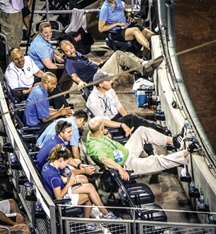 |
|
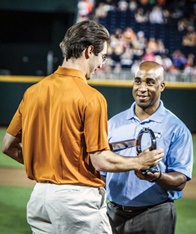 |
|
… spending a few innings with NCAA Baseball Committee members; and doing on-field presentations.
Photo by: NCAA (2)
|
It was shortly after 8 a.m. last Tuesday when he returned to the Hilton from Fit Farm. That’s when he learned the sobering news of two fatalities from a tornado that ravaged a Nebraska town 60 miles north of Omaha the night before.
Making the news hit even closer to home, one of the victims was the father of a security guard at TD Ameritrade Park.
In a midmorning conversation with MECA, the local entity that runs the stadium, Leech asked about the mood of the city and whether a pregame moment of silence would be appropriate. They agreed that it would be.
Leech also worked with local officials to contact the Red Cross and within hours collection areas were established at the stadium. Money from the collection will be funneled through the Red Cross to parts of the state most affected by the overnight tornados.
At noon, two hours before the day’s opening game between Texas Tech and Mississippi, Leech ducked into a security meeting on the second floor of the Hilton. About a dozen officials representing Omaha police, fire, emergency, public works, MECA, FBI and other local agencies gathered for the daily briefing.
Leech mostly listened, but he was curious about whether misting stations could be created in the fan fest adjacent to the stadium because of the 90-degree temperatures. Officials told him the city requires a certain grade of potable water and it couldn’t be done last week, but misting stations will be added to the to-do list for 2015.
Over the course of the afternoon, Leech dealt with health hazards being created by pigeon droppings; local street vendors outside the stadium who physically hold and threaten shoplifters for money; and Twitter geeks who solicit new followers by saying they’ll streak onto the baseball field if they get enough.
As day turned into evening and the Virginia-TCU nightcap began, Leech greeted several corporate partners at the park and hosted them in the NCAA’s suite, along with officials from Turner and CBS, the NCAA’s rights holders.
“It was good,” Leech said. “So many of the partners are aware of the College World Series, but they’ve never been. To have the chance for them to experience the event and see the stadium was really good.”
■ ■ ■
This is the first year the buck stops with Leech. In his 15 years with the NCAA, he has gradually taken on more responsibility, to the point that he essentially ran the CWS the last few years.
But during that time, Dennis Poppe, the longtime administrative face of the CWS, still was the ultimate authority. After 26 straight College World Series, Poppe became a godfatherly figure over the event.
But Poppe saw Leech’s potential and identified Leech as a rising star at the NCAA before most. They began talking succession plan three years ago.
Poppe retired after last year’s CWS, handing over the reins full time to Leech.
“I never knew that he did so many interviews about the weather,” Leech said with a laugh. “We talk about the weather more than we do
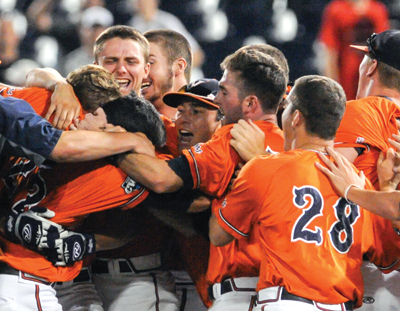 |
|
Adjacent to the ballpark is the CWS Fan Fest, with numerous merchandise and food vendors; Leech’s day ends with Virginia’s 15-inning victory.
Photo by: AP IMAGES (2)
|
baseball.”
The complexities of the job extend well beyond the weather, though. Because the event is such a fixture in Omaha, the city takes on more ownership than most hosts of NCAA championships. In fact, a local business — College World Series of Omaha Inc. — was established to be the year-round contact for Leech, and it employs six employees throughout the year.
Now that Leech is the full-time point person for the CWS, he’s learning just how many stakeholders rely on him, from ESPN, to marketing partners, emergency services, Omaha Mayor Jean Stothert, MECA, local host Creighton and other media.
“When we go to meetings, I’ve always been impressed with Damani’s presence,” said Poppe, who watched the CWS from the NCAA’s suite last week, this time as a guest.
“We work with athletic directors, commissioners, coaches, a lot of very strong-willed people. And you know how people are in meetings, reading their email, looking at their phones. But when Damani begins a presentation, they always look up and pay attention. That told me that these people respect him, and they respond to him. With all of the relationships you have to have, that’s important.”
In Leech’s 10 years of working on the College World Series, it has turned a profit each year. Its net revenue increases have been 3 to 5 percent each year, except in 2011, the first year in TD Ameritrade Park. Net revenue jumped more than 50 percent that year. New premium areas, including suites and club seats, which weren’t in abundance at Rosenblatt, buoyed the profits more than usual.
But general-admission seats in the outfield still go for $9 apiece. Reserved seats range from $37 to $45 per game.
And Leech isn’t inclined to raise prices, at least not now.
He’s especially sensitive to the local fans, who make up the majority of the ticket buyers. Affordable tickets, after all, are one of the many things that make the CWS a cultural happening in Omaha.
“That’s part of the beauty of it,” Leech said. “The biggest chunks of fans are not fans from a particular school. If it’s 90 degrees outside and people bought a ticket to go on that night, they’re going to go.
“It’s that kind of event.”










